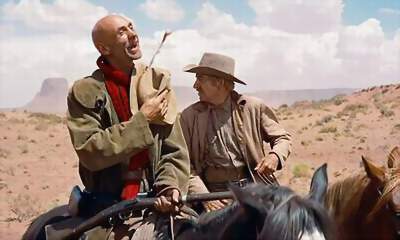The Actor’s Guide to Dungeon Mastering: Character Actors
My approach to serving as Dungeon Master comes from a (distant) background in acting. Fun fact: I was a theater major in college, but I switched to journalism and public relations for reasons of the heart. I loved acting and theater…still do! And think that some of the principles lend themselves perfectly to D&D. So what follows is the Actor’s Guide to Dungeon Mastering! You can read part one, but don’t need to in order to understand this post.
Dungeon Master Lesson Two: Character Acting
If there’s one mistake a lot of GMs make, it’s confusing who the star of the campaign is. Hint: It’s the player characters.
 Yes, the DM is the one person who always gets a say, who has the final word, and who can ultimately control the narrative. But…a good campaign where everyone walks away happy usually involves the players feeling like the big names on the marquee. They’re Frodo, Aragorn, and Legolas.
Yes, the DM is the one person who always gets a say, who has the final word, and who can ultimately control the narrative. But…a good campaign where everyone walks away happy usually involves the players feeling like the big names on the marquee. They’re Frodo, Aragorn, and Legolas.
The DM is Dead Orc # 4.
And nothing derails a good time faster than a Dungeon Master who is hellbent on making the story about their own characters. “Yes, the party is trying to destroy my chaotic evil Necromancer, but the real story is about how the Necromancer (played by me) experiences his ultimate fall into corruption and subsequent death.”
Wrong. The real story is about how the players banded together to vanquish the Necromancer. Or, depending on the party alignment, usurping the Necromancer to establish an even darker grip on the horrified townspeople sitting below his mountain keep. Dungeon Masters, if you want your characters to be the leads, write a book. But don’t take it out on your poor players.
The best advice I can give to avoid making the narrative about The DM or one of the DM’s NPCs is to emulate the character actor.
A character actor or actress plays a supporting role, and usually distinguishes themselves by some quirk or eccentricity. They’re memorable, and might even steal a scene, but the story isn’t about them.
Take Mose Harper from one of my favorite John Wayne movies, The Searchers. He’s a weirdo, for lack of a better word. But in spite of his eccentric desire just to sit in a rocking chair, old Mose picks up a rifle and later provides a key plot point to help the real star of the movie (The Duke) save the day. A DM can fill this role in countless ways, whether it is as a town guard, a lone thief, a semi-retired adventurer…you name it. Maybe they’re helpful, maybe they’re useless, maybe they’re funny, maybe they’re evil. The point is, they’re a vehicle to support the leading actors and advance the narrative.
So that means they’re not better than the PCs at nearly everything. They don’t always see what all the characters miss. They aren’t quick to put the player characters down because they’re so smart, and if they are. They’re not fearless. They back down quickly when the group’s Barbarian gets in their face.
My point is, a character actor is in the narrative to make the lead look good and convincing. DMs that miss this point end up using the player characters to make themselves look good.
It ends up being kind of a bummer.
Now I know that not every NPC can be completely subservient to the players. Dungeon Masters have to handle NPCs that range from lowly shopkeepers to random monsters to dark and sinister Baron pulling strings as part of a nefarious and far-reaching plot. But even powerful characters like Kings, Wizards, and Dragons are there to advance the player’s story. Smaug was so much more powerful than Bilbo, but no one confused him for the lead character in The Hobbit.
Evaluate your campaign as a whole. Are the NPCs advancing the story, building the world, helping the players look like leading men and ladies? If so, good.
Or, are they extensions of your personality? Does the otherwise cowering peasant make a crack about the elf with the missing fingers, because you, the DM, want to rub in the self-damage caused by the natural one she rolled?
We had an episode recently where I played a tavern full of hopeless drunks and the party decided they’d flex their muscles and brandish their knives to extract a little information. One of the drunken NPCs found a dagger pricking his stubbly neck fat. A Dungeon Master who makes the NPCs the lead probably would have sputtered some kind of witty line, or acted inexplicably brave in the face of danger, or…Surprise!…the drunk is actually a 10th level monk, who disarms the player threatening him and throws them into a stack of wooden chairs.
But…I’m was a character actor in that situation, not the lead. You can listen to the episode to hear exactly how I handled it, but let’s just say there was a lot of crying, blubbering, and panicked yelps. How would you have handled it? As the lead actor, or as the character actor?
No one has a larger impact on the fun or misery in a game than the Dungeon Master. Making your NPCs character actors will usually result in players that feel like they really are the center of a vast fantasy world. That means they’ll have fun. And that’s the whole reason we play, right? Go have fun!
Interested in hearing me DM?
 Sci-Fi Writers Playing Old School D&D.
Sci-Fi Writers Playing Old School D&D.A group of authors gather together and play vintage Dungeons and Dragons modules, plus collaborate on a homebrew campaign. Listen every week for hilarious high adventure!
The post The Actor’s Guide to Dungeon Mastering: Character Actors appeared first on JasonAnspach.com.



